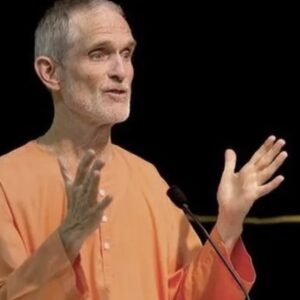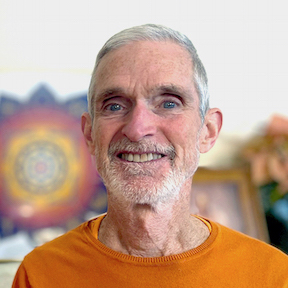Teaching of the Month: Service and Self-Care
by Swami Ramananda
We all probably struggle at times to make wise choices when deciding between taking care of others and taking care of ourselves. Many of us were raised with a strong work ethic that is reinforced by the “gotta get ahead” mentality of American culture, right along with the sometimes conflicting value placed on sacrifice in Judeo-Christian faiths and the Yogic teaching of selfless service. No wonder we can feel pulled in different directions.
Sri Swami Satchidananda articulates clearly in his book, The Golden Present: “You yourself should know how much you can give. You cannot give beyond your capacity. If you have done a lot of service that day, and if you are really tired, you should say no. Otherwise you are saying no to your own body or mind.”
A physical capacity is one thing. When we’re dead on our feet, we probably know it. But there’s also a mental capacity, a pschological one to work with. Just how far is it healthy to extend ourselves? If we push ourselves too far, we may find ourselves with unhappy moods arising, dwelling on unhealthy thoughts, saying to ourselves, “Why should I have to do this? It’s not fair.” or the opposite, “I should do this. I’ll show them how good I am.” Both those ideas are based on judging and comparing ourselves to others, and are products of the ego—that persona we have unconsciously developed that compels us to look good in the eyes of others. This isn’t who we really are, or what we want to encourage.
Of course, selfless service is a key element of Yoga in action and can be a tremendous source of joy and fulfillment. But it is meant to consider the well-being of everyone—including ourselves, .It’s not about a form of self-denial. We can be so focused on” doing the right thing” or promoting a successful image to sustain a reputation that we ignore our own needs. After periods of self-denial, we may feel resentful and needy, and react to that by making selfish choices.
Even when we do think about our needs in a healthy way, taking care of ourselves may feel self-indulgent. It is so important to remember that taking good care of ourselves is not in conflict with service. It makes it possible to serve with sustained energy, a focused mind and an open heart.
We can all practice finding a balance between service and self-care so that we don’t go overboard by either giving too much or too little. And, of course, this discernment is aided by a daily meditative practice that builds enough clarity and awareness to catch ourselves falling into overdoing or being self-centered. Observing our habitual tendencies, we can learn to see when we need to show more compassion for ourselves or could reach out more often to lend a hand.
Fortunately, we have countless opportunities to practice service and self-care every day, whether we are driving, listening to a friend, checking out at the grocery store or working with others. Clearly, the best motivation for serving others comes from experiencing for ourselves the feeling of compassion flowing through our hearts, and the natural sense of joy that arises from giving freely. Ultimately, we are all learning, one act of kindness at a time, that loving each other and loving ourselves are actually the same thing.
Join Swami Ramananda for his upcoming workshop, Deepening Your Yoga Practice, On and Off the Mat a 3-part course, online and in-person, 3 Thursdays; Feb 13, 20 & 27. Together we will explore how to experience maximum benefits from even a short daily Yoga practice on the mat, and how the teachings of Yoga can be integrated into our daily activities.
 Swami Ramananda C-IAYT, E-RYT 500, is the Executive Director of the Integral Yoga Institute in San Francisco and a gr.eatly respected senior teacher in the Integral Yoga tradition, who has been practicing Yoga for over 45 years. Ramananda offers practical methods of integrating the timeless teachings and practices of Yoga into daily life, and transforming the painful aspects of human experience into steps toward realizing one’s full potential.
Swami Ramananda C-IAYT, E-RYT 500, is the Executive Director of the Integral Yoga Institute in San Francisco and a gr.eatly respected senior teacher in the Integral Yoga tradition, who has been practicing Yoga for over 45 years. Ramananda offers practical methods of integrating the timeless teachings and practices of Yoga into daily life, and transforming the painful aspects of human experience into steps toward realizing one’s full potential.
He leads all levels of Yoga teacher trainings and programs around the globe. Ramananda co-developed the Stress Management Teacher Training program and has trained many teachers to bring Yoga into corporate, hospital and medical settings. He a founding board member of Yoga Alliance and is a co-founder of The Spiritual Action Initiative which brings together individuals committed to working for social justice for all beings and for the care and healing of our natural world. His warmth, wisdom and sense of humor have endeared him to many.





 Deborah Kesten, MPH, is a nutrition researcher and award-winning author, specializing in the multidimensional power of food to heal. Her research career began as Nutritionist on Dean Ornish MD ‘s first clinical trial for reversing heart disease, which is an Integral Yoga-based lifestyle program inspired by IYI founder Swami Satchidananda. She also specializes in the health-and-healing benefits of ancient food wisdom from cultural traditions (such as Yogic Nutrition), world religions (Hinduism, etc.), and Eastern healing systems (such as India’s Ayurvedic Medicine), and in preventing and reversing overweight, heart disease, and other diet-linked chronic conditions.
Deborah Kesten, MPH, is a nutrition researcher and award-winning author, specializing in the multidimensional power of food to heal. Her research career began as Nutritionist on Dean Ornish MD ‘s first clinical trial for reversing heart disease, which is an Integral Yoga-based lifestyle program inspired by IYI founder Swami Satchidananda. She also specializes in the health-and-healing benefits of ancient food wisdom from cultural traditions (such as Yogic Nutrition), world religions (Hinduism, etc.), and Eastern healing systems (such as India’s Ayurvedic Medicine), and in preventing and reversing overweight, heart disease, and other diet-linked chronic conditions.
